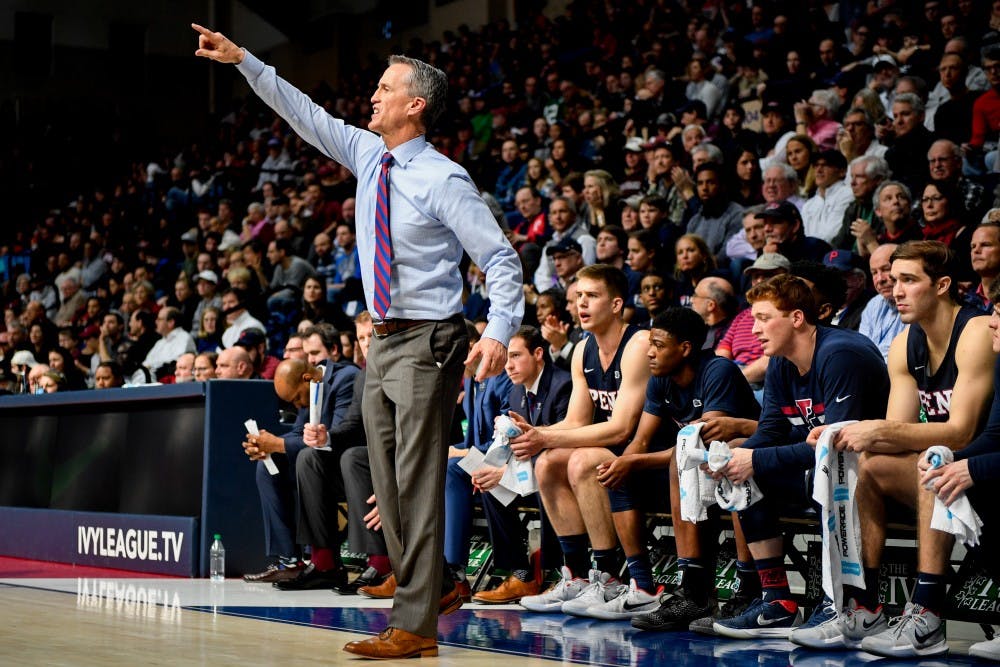
Coach Steve Donahue has experience playing against Kansas from his days at Cornell, and he will look to use that to the Quakers' advantage on Thursday.
Credit: Chase SuttonDon't jump to conclusions just yet.
For those who have not yet seen the tournament seeding, Penn men's basketball is a No. 16 seed playing No. 1 seed Kansas, a consistently great program coached by a Hall of Fame coach, Bill Self. Kansas even has multiple top recruits and future NBA stars on their roster. On top of that, the game is being played in the state of Kansas, nearly rendering this a home game for the Jayhawks. And, on top of all of that, no No. 16 seed has ever defeated a No. 1 seed in NCAA Tournament history.
But, that all has the potential to change this Thursday as the Red and Blue have a chance to stun the Jayhawks.
That’s right, you heard me correctly.
The Quakers have an actual prospect to win this game and move on to the next round in the NCAA Tournament.
This is not an outlandish opinion either, as history and trends actually show that the Red and Blue have a legitimate shot to shock the world.
At the most basic level, this can be seen through the many different basketball rating systems that have the Quakers as an extremely underrated and under-seeded team.
Specifically, one of these ratings systems, Kenpom, which has accurately predicted the success of under-seeded teams in the past, says that the Quakers have more than just a fighting chance.
According to the Kenpom rating system, the last No. 16 seed to be ranked as high as the Quakers was UNC Asheville in 2012. UNC Asheville lost by single digits to the No. 1 seed Syracuse and were within two possessions of the lead with one minute remaining in the game. The game ultimately ended with questionable officiating resulting in a victory for the Orange.
Kenpom currently gives the Red and Blue an 11.2 percent chance of upsetting the Jayhawks.
For reference of how high that probability of winning truly is, the 16 seed with the next highest chance of winning their first round game this year is the University of Maryland, Baltimore County, with a 3.3 percent chance of pulling off an upset.
These odds give Kansas a higher probability to lose their first round game than any other No. 1 seed and No. 2 seed in this year's tournament.
Beyond the current numbers, recent years have shown that, given their seed lines, Ivy League champions have had great success in the NCAA Tournament. In the past eight NCAA Tournaments, Ivy League teams have won four first-round games. In all of these wins, the Ivy League team was awarded a double digit seed, just as the Quakers are this season.
Ivy League teams have had relative success against No. 1 seeds in the past as well. The closest matchup ever between a No. 1 seed and a No. 16 seed was between Georgetown and Princeton in 1989. The Tigers lost this game by only a single point. The Ivy League has come close to accomplishing this daunting task of dethroning a No. 1 seed before, suggesting that the Quakers might just have the makeup to do it again.
Further promoting Penn’s plausibility of a victory over Kansas is the fact that Penn coach Steve Donahue has a good history when playing against Self.
In 2010, Donahue took Cornell on the road to play, at the time, No. 1 Kansas. In a game where Donahue and Cornell had the lead at half time, the Jayhawks were able to come back and win by five, avoiding the upset. This narrow defeat against Self and the Jayhawks is something that Donahue will try to bring to the Quakers this Thursday, once again playing against the one seed Jayhawks on the road.
So, the matchup this Thursday was a tough draw. And no No. 16 seed has ever beaten a one seed before. But, eventually, it is bound to happen.
It looks like the Quakers have as good of a chance as any team before to make history and shock the Kansas Jayhawks and the world.

Zack Rovner is a College freshman from Holland, Pa., and is a sports reporter of The Daily Pennsylvanian. He can be reached at dpsports@thedp.com.
The Daily Pennsylvanian is an independent, student-run newspaper. Please consider making a donation to support the coverage that shapes the University. Your generosity ensures a future of strong journalism at Penn.
Donate







